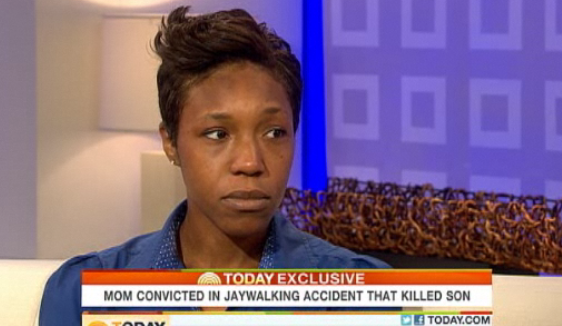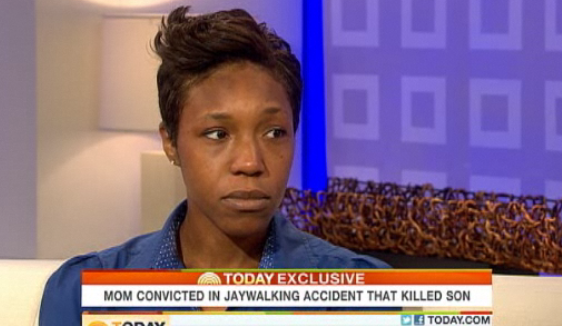 Raquel NelsonCould the Raquel Nelson case be a turning point in the way pedestrian rights are seen in this country?
Raquel NelsonCould the Raquel Nelson case be a turning point in the way pedestrian rights are seen in this country?
I write this shortly after the sentencing in Nelson’s case. In case you haven’t heard of her, Nelson is the Atlanta-area single mother who was convicted of vehicular homicide after her 4-year-old son was struck and killed by a hit-and-run driver who later admitted to drinking and being on painkillers.
Nelson and her three children, ages 9, 4, and 2, were trying to get from a bus stop to their apartment complex directly across a busy road, and there was no crosswalk or pedestrian signal to protect them. It was a shocking, and fatal, case of bad street design. Such autocentric design is only too common around the country; in this case, it was compounded by a mystifyingly aggressive prosecution.
Today, in Cobb County State Court, Nelson was sentenced to 12 months probation and 40 hours community service. Crucially, the judge also offered her an alternative: A new trial that would clear her of wrongdoing in the heartbreaking case. I’m waiting for word on which course she chooses.
No matter what, the sentence is far better than the three years in prison she could have gotten. But why was Nelson in that courtroom to begin with?
Nelson’s conviction earlier this month on the vehicular homicide charge, and the relatively light sentence received by the driver in the case (he got off with just hit-and-run charges, resulting in six months served and probation) attracted outrage from around the country.
Advocacy groups like Transportation for America (T4A) took up the cause immediately. T4A’s David Goldberg wrote a powerful blog post on the case, following up on reporting by Tanya Snyder at Streetsblog Capitol Hill.
Over at Change.org, Eliza Harris of Orlando, Fla., started a petition in support of Nelson that also called for a crosswalk in the place where her son, A.J., was killed. Yesterday morning, the petition had about 58,000 signatures. By the time the sentencing happened, that number had jumped to about 140,000.
That big boost in the last 24 hours before Nelson’s sentencing is probably due in large part to her appearance on the Today show. And this is what gives me hope: that a mainstream outlet like the Today show, with its mass audience and its incredible reach, even saw this as a story.
Could it be that this country might finally be waking up to the idea that access to affordable, reliable, safe transportation is a serious public concern — a matter of civil rights and full enfranchisement in our society?
Today, Wired’s Autopia blog ran a piece entitled “Transportation as a Civil Rights Issue.” It follows up on a report from the Leadership Conference on Civil and Human Rights about transportation equity as a central issue of social justice:
The way the Conference sees it, access to transportation is key to connecting the poor, seniors and those with disabilities to jobs, schools, health care and other resources. It is essential to widening opportunities for all. Many of us take our mobility for granted, but getting around can be a real challenge for millions of Americans.
This is a key issue as Congress considers the surface transportation reauthorization bill, which essentially maps out federal transportation spending and priorities for the next six years.
“Smart and equitable transportation systems connect us to jobs, schools, housing, health care services — and even to grocery stores and nutritious food,” Wade Henderson, president and CEO of the Conference, said in testimony presented to the House Highways and Transit Subcommittee. “But millions of low-income and working-class people, people of color and people with disabilities live in communities where quality transportation options are unaffordable, unreliable, or nonexistent.”
Transportation systems, and streets, need to be not only smart and equitable They also need to be safe. According to the Leadership Conference’s report, Hispanic pedestrians suffer a death rate 62 percent higher, and African Americans almost 70 percent higher, than non-Hispanic whites.
Several months ago, I spoke to Angela Glover Blackwell of PolicyLink about the connection between transportation and social justice. When I ran into her recently at the Ford Foundation forum on “The Just City,” I told her how often I have had occasion to reference our conversation. Here’s what she told me then:
[M]ost of the civil rights struggle in this country has centered around transportation, in one way or another, starting with Plessy v. Ferguson [in 1896]. That had to do with access to train cars. Then we have Rosa Parks sitting down on a bus. We had the Freedom Riders trying to do something to show that black people ought to be able to ride a bus across jurisdictions, they ought to be able to ride through the South on a bus without having to go to the back of the bus. The whole urban renewal, which people often call “black removal,” because that’s what happens, in the 60s, was a fight around highways coming in, going right through communities that had been vibrant, often destroying the financial district in an African-American community.
So if you go all the way from Plessy v. Ferguson right up to the urban renewal, you will see that the fights have often been around transportation, and how transportation decisions have been made.
It seems to me that the Raquel Nelson case has taken a place, however small, in this historic tradition. Maybe that’s too optimistic. But at least it’s a beginning.




